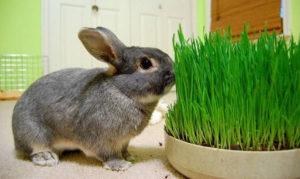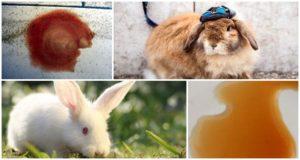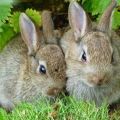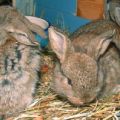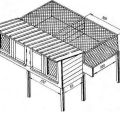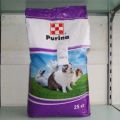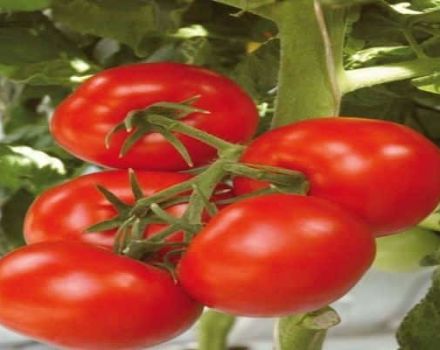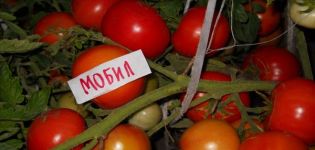What do domestic rabbits eat, types of food and feeding rules for beginners
Before buying food, you need to find out what domestic rabbits eat and what you can feed them. The main food of these animals is green succulent grass, with the exception of poisonous plants. In winter, they switch to hay and vegetables. Rabbits recover quickly if they are given cereal mixtures, boiled potatoes, wet mash. Weakened animals are added vitamins and premixes to the feed or injections of immunocorrectors.
Types of rabbit food
Rabbit breeders know that you cannot grow rabbits on hay and grass alone. Animals must also be fed with grain, vegetables, feed them, vitamin and mineral supplements. Different types of feed are given to rabbits daily, in certain proportions. The diet is made in such a way that the animals receive a maximum of nutrients and at the same time do not experience digestive problems.
Roughage
This is hay, straw, chaff, tree branches, hay or grass flour. Rough feed is given to rabbits, mainly in winter. True, tree branches should be present in the diet all year round. Hay is a source of various vitamins, including D. The value of this feed is undeniable. Hay should be harvested at the time of flowering or heading and dried in the sun. Most of all benefits from clover, alfalfa, meadow grasses. The daily hay rate for adult (young) rabbits is 300 (100) grams.
It is recommended to feed the animals with branch feed (1-2 branches per day) all year round. It is an excellent tool for grinding incisors and replenishing the body with vitamins. Rabbits happily gnaw on the branches of an apple, pear, hazel, grapes, linden, oak, conifers. It is undesirable to give animals branches of birch, elderberry, wolf bast, as well as cherries, apricots and other stone fruits.
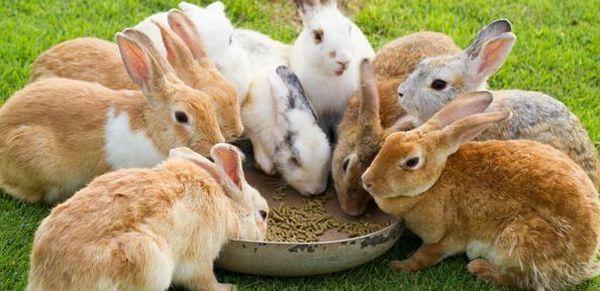
Green feed
These are fresh herbs, branches with leaves, tops of vegetables (carrots, rutabagas, beets). Green food is the basis of the diet in summer. The daily rate of fresh herbs is 500-1500 grams (depending on age). Beet tops are given about 50-200 grams per day.
It is recommended to feed rabbits with nettles, chamomile, plantain, clover, alfalfa, peas. Animals are happy to eat freshly cut green cereal grasses and crops: rye, wheat, oats, corn.It is not recommended to give henbane, buttercups, horsetail, dope, milkweed, belladonna.
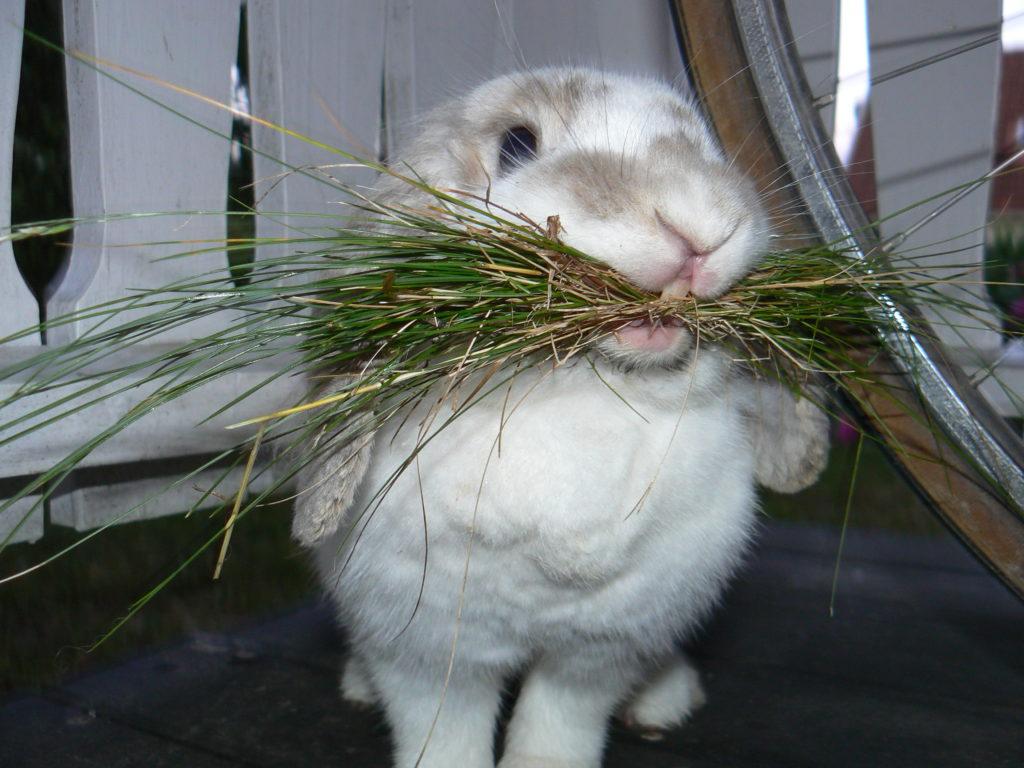
Concentrates
These are compound feed, grain, cake, meal, bran, chaff. Rabbits can be fed with such cereals: wheat, corn, barley, oats. Cereals are given in crushed form. Rabbits, especially young rabbits, do not digest whole grains well.
Depending on age, animals are given 50-150 grams of grain per day, meal or cake - 20-100 grams, mixed feed - 100-200 grams. Rabbits are mainly fed with cereal mixtures, that is, crushed wheat, oats, corn in equal proportions.
Animals happily eat yellow peas, white beans, soybeans, sunflower seeds and pumpkin seeds. Legumes are also given to rabbits in crushed form. The daily rate of legumes is 20-50 grams, sunflower seeds - 10-20 grams.

Juicy feed
These are vegetables, root vegetables, melons, silage. Animals happily eat cabbage, turnips, carrots, pumpkin, beets, zucchini, watermelons, rutabagas. The norm per day is 100-600 grams (depending on age). Boiled potatoes can be fed to rabbits. The daily rate is 50-100 grams. For the winter, the animals are harvested silage from green corn stalks. The norm is 100-300 grams per day.
Vitamins and minerals
These are vitamin preparations ("Chiktonik", "Prodevit") and mineral supplements, salt stones ("Chika"), which are sold in veterinary pharmacies and pet stores. Vitamins are given to rabbits from the 30th day of life. The preparations are added to drinking water or feed. Weakened animals are recommended injections of vitamins (Gamavit, E-selenium).
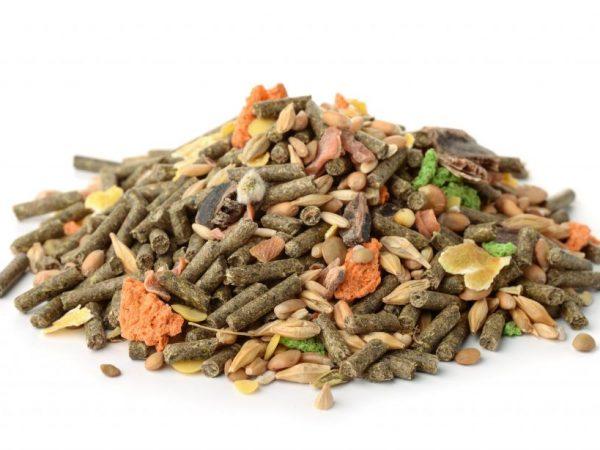
The specifics of feeding at different times of the year
The main food for rabbits is fresh green grass. True, in winter you have to feed the animals with hay. In the cold season, instead of green grass, they are given more succulent feed (vegetables).
In the summer
In summer, rabbits can be fed up to 1.2 kg of green grass per day. To replenish the body with proteins and carbohydrates, animals are fed with a grain mixture (100 grams per day). Rabbits also get vitamins from carrots, pumpkins, beets, cabbage (about 200 grams per day).
In winter
In winter, instead of succulent grass, rabbits are given hay (about 300 grams per day). During this period, it is recommended to feed the animals, mainly vegetables (pumpkin, cabbage) and various root vegetables (carrots, beets). The diet should contain compound feed or grain mixtures (120 grams per day). It is recommended to give sprouted grains, coniferous twigs, vitamin preparations, premixes. The daily norm of vegetables is up to 500 grams.
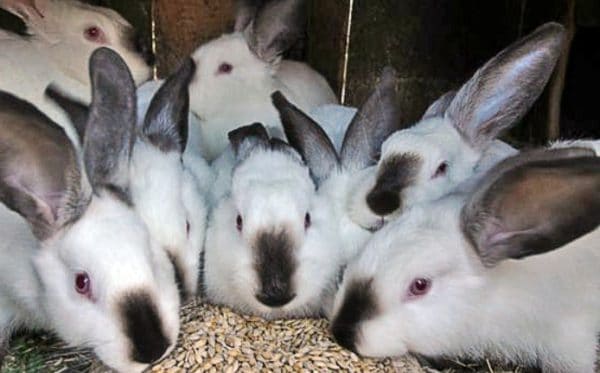
Feeding rules and diet
The diet and feed rate depend on the age and physiological characteristics of the animal's organism. Little rabbits are fed 5 times a day, adults - 2 times in winter and 3 times in summer. Night rest - 10-12 hours. The animals are watered - 1-2 times a day (in between feedings).
During the rest period
In a state of physiological rest, rabbits are completely undemanding to food. True, this does not mean that animals can be fed with anything. Rabbits need a variety of foods, but less. Animals are given 600 grams per day of succulent grass or 200 grams of hay, 80 grams of grain mixture, 300 grams of vegetables. If it is necessary to fatten the rabbits faster, they are given more crushed grain, and wet mashings are prepared from boiled potatoes and steamed cereals.
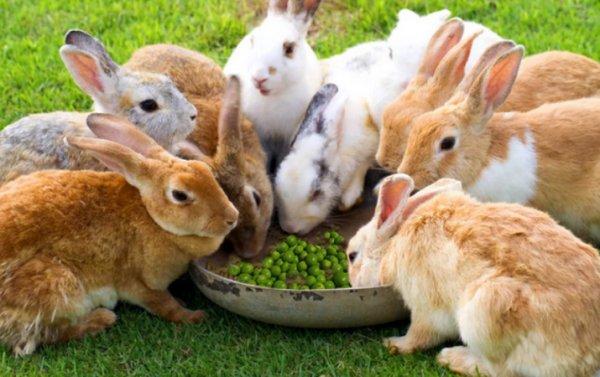
In preparation for mating
When animals are prepared for mating, their diet is enriched with vitamin feed or pharmacy vitamins. Rabbits are fed with green herbs, carrots, beets, sprouted grains, legumes. Meat and bone meal or fish meal, fish oil are added to the feed.
Felted rabbits
Pregnant rabbits are fed a light diet rich in vitamins and minerals. During this period, the fetus develops in the womb, and the body prepares for lactation. In summer, rabbits are fed with fresh grass, root crops, grain mixtures, in winter they give hay, sprouted grain, potato-grain mash and more vegetables.Be sure to add fish oil, meat and bone meal, salt and vitamin preparations to the feed.
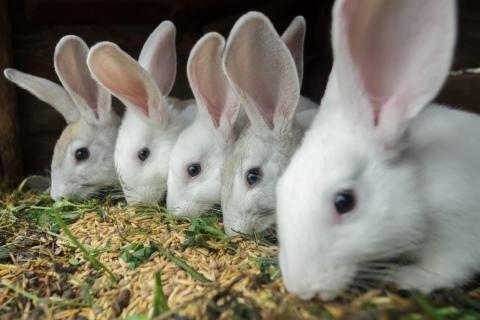
During the suction period
When the females feed the rabbits with milk, they themselves need to be fed foods that promote lactation. Animals are given more succulent green grasses, in winter they are replaced by root crops. Rabbits love potato salted or grain mash with finely chopped nettles, grated carrots, pumpkin, beets. The cage must have fresh water for drinking.
What to feed for fast growth and weight gain
Depending on age, each animal needs its own diet. In the first month of life, rabbits feed mainly on mother's milk. In summer, on day 30, and in winter, on day 45, the rabbits are weaned from their mother. Youngsters are transferred to independent feed. First, they are given dried grass, then fresh. Green juicy food can cause digestive problems and bloating. Young animals are gradually taught to fresh grass. In the village, rabbits are fed with what grows in the meadow or in the garden. Animals are happy to eat herbs, vegetables, tops. In winter, they are fed with hay, grain, root crops.
Cereal mixes are prepared by hand. Animals are given crushed grains of wheat, barley, oats, and corn in equal proportions. Initially, rabbits are taught to grain, that is, they give 10-20 grams per day. The norm per day for an adult animal is no more than 150 grams. Rabbits grow and recover quickly from grain. Animals gain weight well if they are given boiled potatoes (no more than 50-100 grams per day), sunflower or pumpkin seeds (10-30 grams per day), bread (50-100 grams once a week).
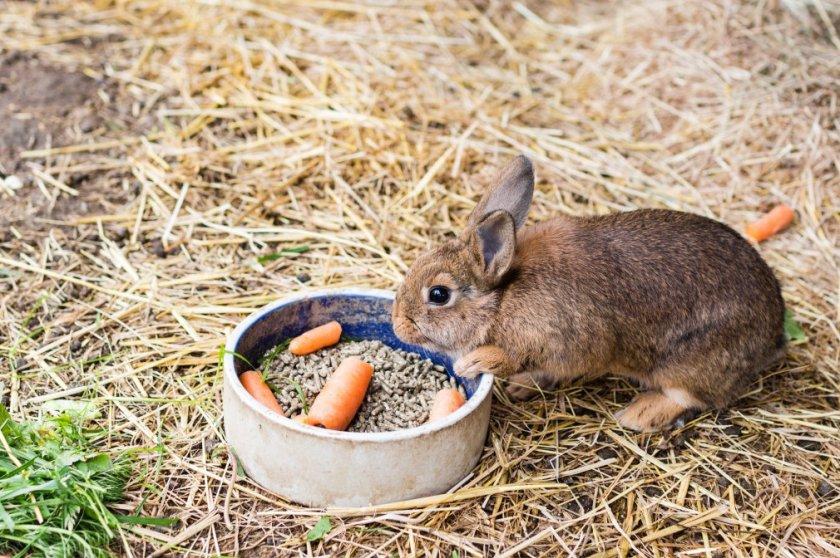
On an industrial scale, rabbits are mainly fed with green grass, hay, and compound feed. At home, animals can prepare a damp mash. It is made from boiled potatoes with the addition of bone meal, mixed feed, finely chopped nettle. Even for novice rabbit breeders, it will not be difficult to prepare a mash of grated pumpkin or beets mixed with steamed crushed grain. In winter, this food is given warm.
Important! New food is introduced into the diet gradually, each time increasing the dose. Leftover food is removed from the trough daily. To avoid eating disorders, it is forbidden to feed rabbits with rotten, moldy, sour feed.
What can not be fed
Rabbits are forbidden to eat poppy, euphorbia, quinoa, lemon balm, mint, dope, sleep-grass and other poisonous herbs. You can feed beets, but only white (fodder or sugar), but not red. You can not give the animals branches of elderberry, apricot, bird cherry. Potatoes are allowed, but only boiled. It is forbidden to feed animals with tomato and potato tops, onions and garlic, meat, milk, sugar.
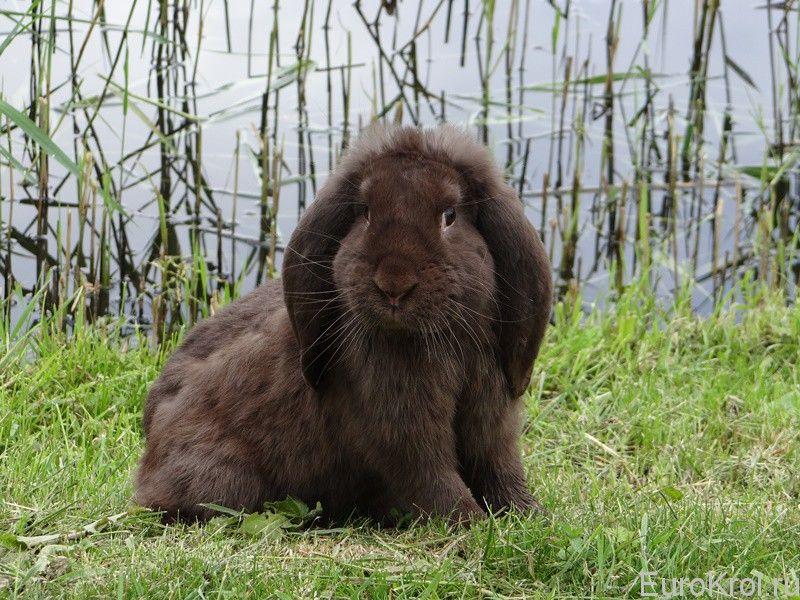
Bread will not do much harm, but it can lead to obesity. Some cereals are not given to animals: rice, millet, millet, rye. It is not recommended to feed rabbits with green peas and black, red beans.
What rabbits eat in nature
Hares and rabbits on the loose in summer eat grass, green leaves, young shoots, in winter - dry hay, bark and tree branches. The diet of these animals consists of plant foods. In summer, animals often make forays into farmers' fields, eat cereals and vegetables. Animals eat everything that they find in the forest: seeds of cones, berries of raspberries, mountain ash, rose hips, bark of young broom, aspen.
